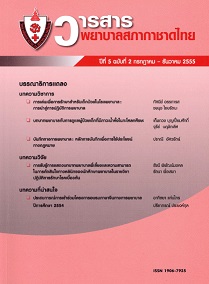บทบาทพยาบาลกับการดูแลผู้ป่วยเด็กที่มีภาวะน้ำคั่งในกะโหลกศีรษะ
Keywords:
บทบาทพยาบาล, การดูแล, ผู้ป่วยเด็กที่มีภาวะน้ำคั่งในกะโหลกศีรษะ, nurse’s role, caring, children with hydrocephalusAbstract
ภาวะน้ำคั่งในกะโหลกศีรษะ (Hydrocephalus) เป็นโรคที่ก่อให้เกิดความพิการทางสติปัญญาในเด็ก และภาวะแทรกซ้อนที่เป็นอันตรายถึงชีวิต หากไม่ได้รับการรักษาและดูแลที่ถูกต้องรวดเร็ว จะทำให้เกิดภาวะความดันในกะโหลกศีรษะสูง มีผลทำให้เกิดอันตรายกับสมอง ทำให้เกิดภาวะสมองพิการ เป้าหมายสำคัญของการดูแลผู้ป่วยเด็กที่มีภาวะน้ำคั่งในกะโหลกศีรษะในระยะก่อนผ่าตัดและหลังผ่าตัด คือ การป้องกันไม่ให้เกิดภาวะความดันในกะโหลกศีรษะสูง และเนื้อสมองถูกทำลายมากขึ้น การดูแลผู้ป่วยเด็กกลุ่มนี้ต้องการความร่วมมือจากครอบครัวเพื่อให้เด็กปลอดภัย มีสุขภาพแข็งแรง ได้รับการรักษาอย่างต่อเนื่องจนกว่าจะได้รับการผ่าตัดในเวลาที่เหมาะสม การดูแลผู้ป่วยเด็กในภาวะนี้เป็นเรื่องที่ยากและซับซ้อนสำหรับบิดามารดาและผู้ดูแล และส่งผลกระทบต่อครอบครัวโดยเฉพาะด้านจิตใจและจิตสังคม บทบาทสำคัญของพยาบาล จึงเป็นการประเมินและวางแผนให้การพยาบาลอย่างเหมาะสม ตลอดจนการให้คำแนะนำแก่ครอบครัวในการดูแลบุตรทั้งระยะก่อนผ่าตัดและหลังผ่าตัด ตลอดจนการดูแลต่อเนื่องที่บ้าน บทความนี้จะนำเสนอสาเหตุ พยาธิสรีภาพ อาการและอาการแสดง การวินิจฉัย การรักษา และการพยาบาล
Nurse’s role in caring of children with hydrocephalus
Hydrocephalus is a brain condition that can lead to brain damage in children and serious complications including death. If not treated and given the correct immediate care, increased intracranial pressure will occur. As a consequence, the brain is injured and cerebral palsy develops. The main objective in caring of children with hydrocephalus for preoperative and postoperative period is to prevent increased intracranial pressure and the destruction of brain tissue. Caring for these children groups needs cooperation from their family to organize children’s safety, health and receive continuous treatment until undergoing surgery at the appropriate time. Caring for children with hydrocephalus is difficult and complicated for parents and caregivers. It also effects the family especially in terms of psychology and social psychology. Nursing plays an important role in assessment and applying an appropriate nursing care plan along with advice for the family in order to care for children in the preoperative and postoperative periods as well as for continuity of care at home. This essay discusses the causes, pathology, signs and symptoms, diagnoses, treatment and nursing care.
Downloads
Issue
Section
License
เนื้อหาบทความหรือข้อคิดเห็นต่างๆ ในวารสารพยาบาลสภากาชาดไทยนี้ เป็นความคิดเห็นของผู้เขียนบทความ ไม่ใช่ความเห็นของกองบรรณาธิการ หรือสถาบันการพยาบาลศรีสวรินทิรา สภากาชาดไทย






